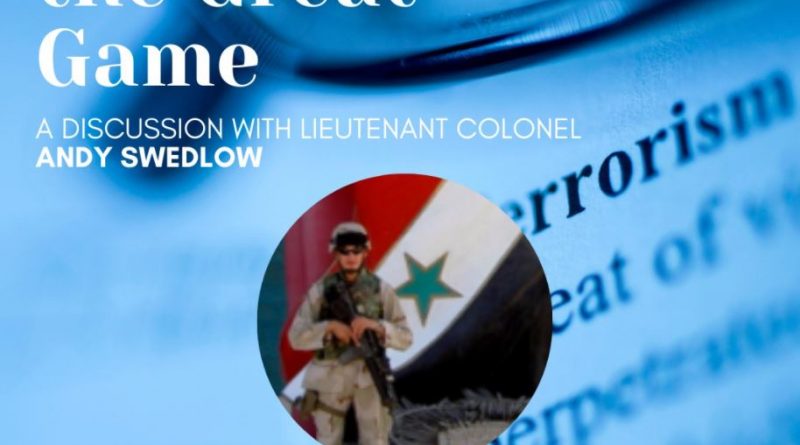Lieutenant Colonel from U.S. Army Intelligence Speaks About ‘Terrorism and the Great Game’
Jasmine DeLeon
Staff Writer
Retired Lieutenant Colonel of the U.S. Army Andy Swedlow gave a presentation on the use of terrorism in the Great Game at the School of Diplomacy on April 8. Swedlow gave a description on the history of the Great Game, different ways nation states utilized terrorism, and the effects of terrorism on the great power competition.
“The use of terrorism in the Great Game by nation states to cover up for their internal or external weaknesses is evident in conflict today,” Swedlow, an expert on intelligence, the Middle East, and North Africa, said.
At the start of his presentation, Lt. Col. Swedlow asserted that Russia and China are the main global competitors for the United States. According to Swedlow, Russia has been competing with the United States on the world stage for the past ten years. He cited Russian bounties on American soldiers in Afghanistan and Russian misinformation campaigns that are designed to hurt credibility of the U.S. government as evidence of this competition.
Swedlow noted how modern China, a relatively new world power since the end of World War II, has been expanding its influence in nations all over the world through its Belt and Road Initiative, as well as other projects. He added that China is growing increasingly aggressive toward its neighbors, including Taiwan and Vietnam, and has been testing the extent of their restraint.
Swedlow furthered that these activities, tied together, “gain the affect of pulling us from the world state or keeping us tied up where we cannot have an impact on what Russia and China are trying to achieve.”
According to Foreign Affairs, the Great Game, which started in the mid-1800s, was characterized by an Anglo-Russian rivalry that took form when Great Britain started pushing back against Russia’s effort to expand its territory and power into Islamic Asia. However, the Great Game ended without the two countries going to war, which many people at the time viewed as inevitable.
Swedlow described the Great Game through several developments, including Great Britain’s attempt to defend its Indian colonies from incursions and protect its trade routes to India. He states that the contested area in the Great Game is where the Ottoman Empire was located. The Muslim population “became an important population in undermining or bolstering one’s position in the Great Game at the time,” according to Swedlow.
A somewhat successful use of terrorism, Swedlow explained, is how the Ottomans used it after taking control of Mecca and Medina in the 1500s: for internal control and to manage restive populations. He described that the Ottoman empire expanded so rapidly that it did not have the infrastructure necessary to administer all its location, causing the Ottoman government to pit rival leaders in places like Damascus and Cairo against each other to maintain control in the region. The result was that the Ottoman Empire staggered on for several hundred years with little legitimacy within its own borders, forcing the empire to be constantly on guard against attack and insurrection.
In his next example, Swedlow cited the Serbian use of terrorism to protect ethnic Serbs from Austrian expansion in the early 1990s. He described this as a “successful but messy use of terrorism.” In 1914, Dragutin Dimitrijević, a Serbian intelligence officer and nationalist who wanted to create a Yugoslavian state, assisted the Black Hand, a secret Serbian society, with the assassination of Archduke Franz Ferdinanad and Sofie Sarajevo. While Dimitrijević intended to create a Yugoslavian state, the assassination eventually led to World War I
“I called it successful because there was a Yugoslavia at some point, but it was extremely messy and there was a lot of unintended consequences in that use of terrorism,” Swedlow claimed.
When asked later in the discussion about how the United States should counter China’s growing influence, Swedlow drew his argument from the previous example of terrorism in Serbia. He explained that while the two ideologies of Serbian nationalist identity and the Black Hand’s anarchist identity seem contradictory, working toward a common short-term goal was what brought them together.
Swedlow concluded the discussion by noting that the best way for the United States to challenge China is by bringing together countries who want to counter China through short-term goals.
Photo courtesy of Seton Hall University


